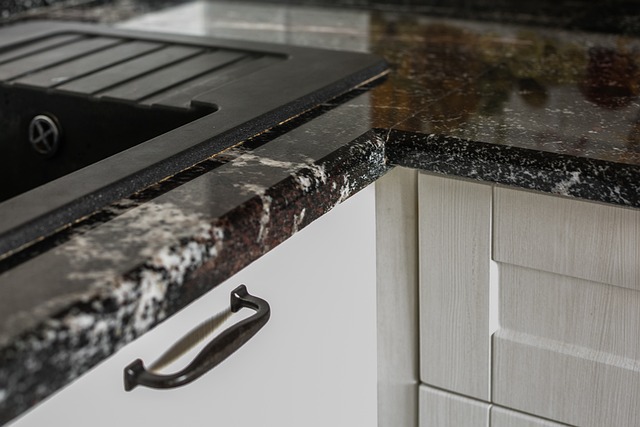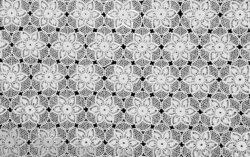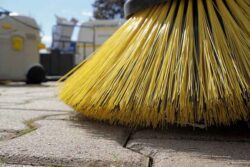
Granite countertops add elegance and durability to any kitchen, making them a popular choice among homeowners. However, to maintain their luster and longevity, it’s essential to understand how to properly clean and care for granite surfaces.
Granite is a natural stone formed deep within the Earth’s crust. It’s an igneous rock composed mainly of quartz, feldspar, and mica. Its unique blend of minerals gives granite its characteristic beauty and strength, making it a popular choice for countertops.
In this comprehensive guide, we will explore step-by-step instructions, valuable tips, and essential do’s and don’ts to ensure your granite countertops remain a stunning focal point in your home.
See also our post on The Ultimate Guide to Cleaning and Caring for Your Quartz Countertops which you will not want to miss.
Understanding Your Granite Countertops
Granite is a natural stone that requires specific care to preserve its beauty and integrity. Before diving into the cleaning process, let’s explore some key characteristics of granite countertops:
Composition and Porosity
Granite is composed of various minerals, such as quartz, feldspar, and mica. While it is a highly durable material, it is not impervious to stains. Understanding the porous nature of granite is crucial for effective cleaning and maintenance.
Sealant Importance
Most granite countertops are sealed during installation to enhance their resistance to stains and spills. Over time, this sealant may wear off, making it essential to monitor and reseal the granite periodically.
Granite Types and Finishes
Granite countertops come in a variety of colors and finishes. Each type may require specific care to maintain its appearance. Matte finishes, for instance, may be more susceptible to stains than polished surfaces.
Why Choose Granite?
- Durability: Granite is renowned for its hardness and resistance to scratches, making it an ideal surface for high-traffic areas.
- Heat Resistance: Granite can withstand high temperatures, allowing you to place hot pots and pans directly on the surface.
- Aesthetics: The natural variations in color and pattern make each granite slab unique, enhancing the visual appeal of your space.
Here is our post on A Comprehensive Guide on How to Clean and Restore Antique Jewelry which you will not want to miss.
Daily Cleaning Routine
Keeping your granite countertops clean on a daily basis is the first line of defense against stains and damage. Follow these simple yet effective steps:
Gentle Cleaning Solutions
Use a pH-neutral, non-abrasive cleaner to wipe down your granite countertops. Avoid harsh chemicals, as they can damage the sealant and compromise the stone’s integrity.
Warm Water and Mild Soap
A mixture of warm water and a mild dish soap can be an excellent daily cleaning solution. Gently wipe the surface with a soft cloth or sponge, removing any spills or crumbs.
Microfiber Cloth Usage
Opt for a microfiber cloth or a soft, lint-free towel to prevent scratching the surface. These materials are gentle on granite and effective at removing dirt without leaving streaks.
Immediate Spill Cleanup
Promptly clean up spills to prevent them from seeping into the porous surface. Blot the spill with a soft cloth rather than wiping to avoid spreading the substance.
Avoid Abrasive Tools
Steer clear of abrasive scouring pads or rough brushes, as they can scratch the granite surface. Stick to soft tools and materials to preserve the countertop’s polished appearance.
Deeper Cleaning Techniques
While daily cleaning is crucial, periodic deep cleaning helps maintain the granite’s resilience and appearance. Follow these steps for a more thorough cleaning process:
Natural Stone Cleaner
Invest in a high-quality granite or natural stone cleaner specifically formulated to clean and protect your countertops. These cleaners are designed to be gentle on the stone while effectively removing grime.
Baking Soda Poultice
For stubborn stains, create a baking soda poultice by mixing baking soda with water until it forms a paste. Apply the paste to the stain, cover it with plastic wrap, and let it sit overnight. This method helps draw out the stain from the granite.
Isopropyl Alcohol
For disinfecting purposes, a mixture of isopropyl alcohol and water (50/50 ratio) can be used. This solution effectively kills germs without harming the granite surface.
Specialty Granite Wipes
Consider using specialty granite cleaning wipes for quick and convenient deep cleaning. These wipes often contain a blend of gentle cleansers and sealant boosters to keep your countertops in top condition.
Professional Cleaning Services
Periodically, it’s advisable to hire professional cleaning services to perform a thorough inspection and cleaning of your granite countertops. Professionals have the expertise and tools to address any issues and reseal the granite if necessary.
See also our post on The Ultimate Guide to Cleaning and Organizing Your Jewelry Collection
Stain Prevention and Maintenance
Preventing stains and maintaining the sealant are critical aspects of granite countertop care. Follow these guidelines to ensure your countertops remain in pristine condition:
Resealing Schedule
Regularly check the sealant on your granite countertops and reseal as needed. The frequency of resealing depends on factors like usage, the type of granite, and the porosity of the stone.
Stain-Resistant Sealers
Consider using a stain-resistant sealer to provide an additional layer of protection against spills and stains. These sealers can be applied during the initial installation or as a resealing treatment.
Use Cutting Boards
Place cutting boards or mats under sharp objects, especially when chopping or preparing food. This practice prevents potential scratches on the granite surface.
Avoid Acidic and Harsh Substances
Steer clear of acidic substances like lemon juice, vinegar, or harsh cleaning chemicals, as they can etch the surface and damage the sealant. Opt for pH-neutral cleaning solutions instead.
Protect Against Heat
While granite is heat-resistant, it’s advisable to use trivets or hot pads to protect the surface from direct contact with hot pots and pans. Sudden temperature changes can lead to cracks or discoloration.
Click here to also have a glance at our post on How to Revive Old and Tarnished Jewelry: Cleaning Techniques which you will not want to miss.
Common Mistakes to Avoid
Understanding what not to do is as crucial as knowing the right cleaning techniques. Avoid these common mistakes to preserve the beauty and longevity of your granite countertops:
Skipping Regular Maintenance
Neglecting regular cleaning and maintenance routines can lead to the deterioration of the sealant and increase the risk of stains.
Using Harsh Cleaners
Avoid using abrasive cleaners, bleach, or ammonia-based products, as they can strip away the sealant and damage the granite surface.
Ignoring Spills
Allowing spills to sit on the countertop without immediate cleanup increases the likelihood of stains penetrating the porous surface.
Using Improper Tools
Using abrasive tools like steel wool or scouring pads can scratch the surface, diminishing the polished finish of the granite.
Neglecting Professional Inspection
Regular professional inspection ensures that any underlying issues with your granite countertops are addressed promptly, preventing potential long-term damage.
Here is our post on A Comprehensive Guide on How to Clean and Maintain Collectibles
Conclusion
Caring for your granite countertops involves a combination of daily maintenance, periodic deep cleaning, and proactive stain prevention. By understanding the unique characteristics of granite and adopting the right cleaning practices, you can preserve the natural beauty and durability of this elegant stone. Regular attention to your granite countertops will not only enhance their aesthetic appeal but also extend their lifespan, making them a timeless investment for your home.







